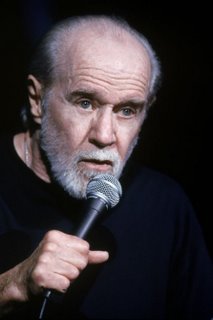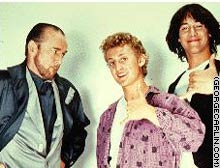 Yes, George Carlin has died of heart failure. He was 71.
Yes, George Carlin has died of heart failure. He was 71.
Check out his Times write-up here. It does a better job of summing up his illustrious career than a chump like me ever could.
I had the pleasure of seeing George Carlin live once — he came to Yale to give a talk; it was billed as something between a lecture and a stand-up set. This was about six, maybe seven years ago.
He also ennumerated his moral and religious beliefs (not many of the latter, Mr. Carlin was none too fond of religion). He spent a fair amount of time on a bit I’ve heard since — reducing the ten commandments to two. I remember what he said, and in lieu of a review of his amazing career here (he hardly needs a guy like me to praise him) I’ll list those two commandments as I still remember them, and a few other remarks on his remarkable legacy, after the jump…
He spent a lot of time talking about his upbringing, which tough and urban and full of strict moralizing that obviously, and thankfully, didn’t quite take.
- Be always honest and faithful to thine source of nookie.
- Try not to kill anybody unless you absolutely have to.
Not his best work — but I remember it because I was there to hear it myself. That was kind of cool, and the kind of memories you share when people pass away.
I hesitate to sum up Carlin’s career by saying he was a great stand-up (yes) or a great actor (less so), because he really was more of an all around cultural critic, especially later in life — a thinker and originator of ideas, and a populist rhetoritician who commanded equally with his compelling ideas and his style in getting him out there. I like to think of him as the late 20th Century’s Erasmus. Except you know he could kick Erasmus’s ass from here to Rotterdam.
And yes, he was very funny. Masterfully so. But mastered to the point where you always knew he had a little more — I can only think of one other time somebody been so widely acknowledged as one of the funniest guys on the planet and still be so remarked on for his broader influence.
I put George Carlin right up there with Richard Pryor as an overall performer without hesitation — they had different strengths and very different cultural influences (Pryor is revered in a way that it will be difficult for anyone else to be revered again, because he was such a trailblazer), but the fact that we’re even in the same ballpark is high, and deserved, praise for Carlin.
I hope for our sake George continues to watch over us and help us pass our history classes.

You’d probably yell at me for saying it if you ever gave a shit who I was, but via con dios.
He had a relationship to language — he talked about it at his Yale appearance, which I also saw — that I think made him unique among his generation of stand-ups — and makes him almost without peer at the moment.
The comparison I want to draw is actually to Steve Martin who, though slightly more high brow, made the same transition from stand-up to movies (again with mixed success, though Steve Martin had a few more mainstream hits) to gadfly.
Sadly, he continues what I’ll call The Welles Curse – great actors who die after starring in embarassing/godawful movies. Carlin’s last live action work was Jersey Girl. His last VO work was the even worse Happily N’Ever After, which thankfully no one in the world saw.
So long, George. I hope in Heaven, you can say whatever words you want.
Now he’s in the Shining Time Station in heaven…
We’ll miss you, Mr. Conductor.
I wouldn’t call Carlin a great actor, but that’s not the point. When you put a guy like Carlin in your movie (or Richard Pryor), you’re not really looking for a great acting performance — you’re looking to bring into your movie a claim to the area of the culture that this person created and helped grow. You’re looking for a slice of their root creativity and style, which presumably follows them into every project.
I never thought Rufus was a really great part or fantasized about what other sort of actor might play it. I’ve never watched a movie and thought Richard Pryor was a really brilliant actor. The three legends in _Harlem Nights_ (Redd Foxx, Pryor and Eddie Murphy) are all out-acted by at least three other members of their casts. The best performance in Bill & Ted’s Excellent Adventure is probably from the guy who plays Socrates.
But that doesn’t change the fact that the presence of these legends defines or helps define (depending on how big their parts are) the movies they’re in because of a vaguer association that doesn’t really have to do with acting, but about a more primary idea of performance.
On a slight tangent, I don’t think Carlin being in Jersey Girl has the same irony to it as Orson Welles as Unicron or Jimmy Stewart in _An American Tail: Fievel Goes West_. When you’re a stand-up comic, you are humbled constantly, and even if you are lucky enough to only have audiences that love you and don’t change from that interaction, you really need a sense of your real and percieved flaws before you go onstage. Carrot Top knows he looks like a crackhead, and he didn’t shy away from it. At least before he got huge, but I don’t think he does comedy anymore, now that he actually cares about perfecting the way he looks. The two are not really that compatible — that’s probably a big contributor to why guys like Schwarzennegger and Vin Diesel are more successful in comedies than equally buff but less self-consciously silly looking actors like Michael Jai White.
For example, Andy Kaufman’s last movie was a robot love story called _Heartbeepers_ that totally bombed in the box office and would have severely hampered his long-term career prospects if he’s lived more than a couple of years longer. But I don’t think it’s ironic or dents his legacy, because comics gain status through other channels than the austerity claimed by serious actors.
Steve Martin is another guy Carlin’s league, but Martin was a better actor than Carlin, more presentational onstage once Carlin turned away from his initial, more character-driven style. It’s kind of funny which comic actors, sketch actors, improvisers, stand-ups, etc. actually transition to becoming “actors,” (like Jim Carrey) and which perform in a lot of movies, but never really lose the style, perception or expectation of being “comics” (like Mike Meyers, who I think doesn’t really act that much at all, but brings his personal style with him into projects, which helps them succeed performatively, when it is allowed to breathe and be productive). And I’m not just talking about genre. _Wayne’s World_ is a very different sort of movie than _Ace Ventura: Pet Detective_, and I’d place Carlin’s movie work more in the former than the latter.
Another context of looking at this phenomenon would be looking at the Wayanses. Keenan was always the total package, and Damon has always been the best actor (and the odds-on favorite back in the 90s for mainstream success), but Shawn and Marlon, the dark horses, have ended up being the most successful, because they didn’t create bodies of work as actors, they create cultural influence as comics.
But yeah, back to Carlin; I think his career is really an example of an all-around cultural legend, maverick, a really generative, original personality and creative professional, not as primarily an actor or a stand-up or that other stuff. But maybe that was colored by my own experience in person seeing him, which solidified in my mind his later work as the real fulfillment of his personal artistic mission.
Before beginning, I’d like to call attention to the kaleidoscopic array of high- and low-culture reference in that last comment. That is really what makes OTI unique.
That said, I’m not sure the main distinction Pete is trying to make — that on the one hand there are serious actors whose prospects are permanently dimmed by a shitty movie and on the other there are comics for whom a flop doesn’t matter because the experience of being a flop is what made them successful comics to begin with — holds up in practice.
The AFI honored Warren Beatty with a lifetime achievement award recently, and it prompted a review of his entire career. THERE’S a guy who has weathered some colossal flops — and I mean Heaven’s Gate caliber flops — to come back and do some really awesome stuff.